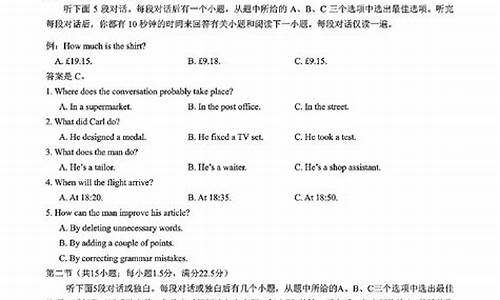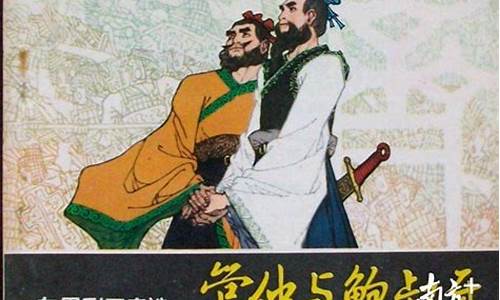您现在的位置是: 首页 > 教育改革 教育改革
2016高考的听力原文_2016年高考听力
tamoadmin 2024-06-14 人已围观
简介1.求福建省历年高考英语听力音频和原文2.20163月18日贵阳高考英语听力题目1,2,3,4,5,6,7,8,9,10,11,12,133.2016年山东高考英语有听力吗学科网。为了进一步配合广大师生教学或复习备考,学科网推出《各地最近几年高考真题英语听力汇总(MP3+听力原文,打包)》专辑,本系列具有权威性、全面性和准确性,是广大师生日常教学的有益补充及优质学习资源。求福建省历年高考英语听力音
1.求福建省历年高考英语听力音频和原文
2.20163月18日贵阳高考英语听力题目1,2,3,4,5,6,7,8,9,10,11,12,13
3.2016年山东高考英语有听力吗

学科网。为了进一步配合广大师生教学或复习备考,学科网推出《各地最近几年高考真题英语听力汇总(MP3+听力原文,打包)》专辑,本系列具有权威性、全面性和准确性,是广大师生日常教学的有益补充及优质学习资源。
求福建省历年高考英语听力音频和原文
你将听到以下内容
-Excuse me? Can you tell me how much the shirt is ?
-Yes, it's nine fifteen.
你将有五秒钟的时间将正确答案标在试卷上,衬衫的价格为9磅15便士,所以你选择B项,并将其画在试卷上。现在你有5秒钟的时间阅读第一小题的有关内容。
20163月18日贵阳高考英语听力题目1,2,3,4,5,6,7,8,9,10,11,12,13
2014年福建省高考英语听力原文
Text 1
W: Excuse me. This is the address. How do I find it?
M: Right. You’ll need a street map. Here’s one, and I’ll show you where it is.
Text 2
W: Oh my! My car broke down, and I have to meet my aunt at the railway station before noon.
M: You’re lucky. I can drop you off on my way.
Text 3
W: Did you hear that Mr. Peterson is coming next week, Gordon?
M: Yes, so I called all the department heads to my office this morning. We need to give him reports on our program.
Text 4
W: I hope you like the book I lent you. I wasn’t sure if you’d be interested.
M: I had the same doubt at first. But once I started, I simply couldn’t put it down.
Text 5
W: What is going on? It’s May, and we still have to wear warm clothes.
M: Well, there’s some good news on the radio. You probably can wear shorts tomorrow.
Text 6
W: Harry, let’s play some ping-pong today.
M: I’d love to play a set or two, but my right arm hurts. I’ve decided to stop playing ping-pong until it feels better.
W: Well, how about going skating?
M: I’d like to, but my knee hurts, too.
W: Harry, stop making excuses! You’re just lazy.
M: No, I’m not! You know, there’s a basketball match on TV today. Let’s just stay home and watch it.
W: OK. You stay, and I’ll play with Helen.
Text 7
W: What do you want to do tonight?
M: How about going to the cinema? I should be home from work at 5:45. Then we can go out and eat before we see a film.
W: What do you want to see?
M: There’s a good art film at the Green House Cinema.
W: Let’s see…it starts at 6:15. I don’t think we can get there in time to see the beginning. How about the action film at the New State Cinema? It starts at 6:50. Perhaps the 7:00 one at the UME Cinema is even better. It stars Jackie Chan.
M: OK, that’s fine. I like him, too.
Text 8
M: Hey, Lucy. Do you have some time to talk about next week’s trip with me?
W: Sure, Dave.
M: OK. So, we’re leaving on Monday from Hartsfield International Airport, and returning on Friday. Do we take ourselves to the airport? Maybe we need to book a taxi, or just go by bus.
W: No, we don’t have to. The company car will pick us up and take us there.
M: Oh, that’s good. When?
W: Our flight leaves at 11:00 a.m., so they should pick us up between 8:00 and 9:00 a.m. Besides, the company pays for our trip, including hotel and food.
M: How much will that be?
W: Well, New York is a pretty expensive city. So, each of us will get $200 a day.
M: Oh, OK. Thanks for telling me that.
W: You’re welcome.
Text 9
W: Please sit down. Let’s see…you’re Mr. Smith. Is that correct?
M: Yes. John Smith.
W: And you’re interested in this job?
M: Yes, I am. I’ll graduate from college the coming June. My major is Chinese.
W: I see. Have you ever done any work in this field?
M: Yes, I used to be a tour guide for Chinese travellers.
W: Good. Now, how much money do you expect to have for a year?
M: From what I’ve read, it seems that a starting pay would be around $12,000 a year.
W: Here, you would start at $10,500 for the first year…a kind of training period. Then you would go to $15,000.
M: That sounds fair enough. What do you think are the chances for me to get a job here?
W: Well, I’m talking to three people today and four tomorrow. We’ll be hiring two people. You’ll hear from us sometime next month. Good luck! And thanks for coming in today.
Text 10
M: Well, I’d love to share with you my personal opinions on city life and life in small towns. I grew up in a small town until I was 18 and then moved to a big city, so I have experienced the good and bad sides of both. I never thought that I would like living in a big city, but I was wrong. After ten years of living in one, I can’t imagine ever living in a small town again. Surely small towns and big cities both have some problems in terms of transport. In a small town, you have to own a car to make life comfortable. You can’t get around without one because there isn’t any kind of public transport. Big cities generally have heavy traffic and expensive parking, but there you have a choice of taking public transport, which is cheaper than driving. So, if you don’t have a car, you’d better live in the city. I also love the exciting life in big cities. I can always enjoy a lot of films, concerts, and other wonderful shows. However, these things are not common in small towns. The final thing I like about large cities is that you can meet different kinds of people. However, you seldom find such a variety of people in a smaller town. I think that living in an area where everyone was just like me would quickly become dull. Of course, safety should be considered, and that’s one area where small towns are better than big cities. Still, I would rather be a bit more careful and live in a large city than to feel safe but dull.
第一节(共5小题,每小题1.5分,满分7.5分)
听下面5段对话。每段对话后有一个小题,从题中所给的A、B、C三个选项中选出最佳选项,并标在试卷的相应位置。听完每段对话后,你都有10秒种的时间来回答有关小题和阅读下一小题,每段对话仅读一遍。
例:How much is the shirt?
A. £19.15 B. £9.18 C. £9.15
答案是C。
1.What does the woman want to do?
A. Find a place. B. Buy a map. C. Get an address.
2.What does the man do for the woman?
A. Repair her car B. Give her a ride C. Pick up her aunt.
3.Who might Mr. Peterson be?
A. A new professor B. A department head C. A company director.
4. What does the man think of the book?
A. Quite difficult. B. Very interesting. C. Too simple.
5. What are the speakers talking about?
A. Weather B. Clothes C. News.
第二节(共15小题,每小题1.5分,满分22.5分)
听下面5段对话或独白,每段对话或独白后有几个小题,从题中所给的A、B、C三个选项中选出最佳选项,并标在试卷的相应位置。听每段对话或独白前,你将有时间阅读各个小题,每小题5秒钟;听完后,各小题给出5秒钟的作答时间。每段对话或独白读两遍。
听第6段材料,回答6、7小题。
6. Why is Harry unwilling to join the woman?
A. He has a pain in his knee.
B. He wants to watch TV.
C. he is too lazy.
7. What will the woman probably do next?
A. Stay at home.
B. Take Harry to hospital.
C. Do some exercise.
听第7段对话,回答8、9小题。
8. When will the man be home from work?
A. At 5:45 B. At 6:15 C. At 6:50
9. Where will the speakers go?
A. The Green House Cinema. B. The New State Cinema. C. The UME Cinema.
听第8段对话,回答第10至12题。
10. How will the speakers go to New York?
A. By air. B. By taxi. C. By bus.
11. Why are the speakers making the trip?
A. For business. B. For shopping. C. For holiday.
12. What is the probalbe relationship between the speakers?
A. Driver and passenger B. Husband and wife C. Fellow workers.
听第9段对话,回答第13至16题。
13. Where does this conversation probably take place?
A. In a restaurant. B. In an office. C. In a classroom.
14. What does John do now?
A. He’s a trainer. B. He’s a tour guide. C. He’s a college student.
15. How much can a new person earn for the first year?
A. $10,500. B. $12,000. C. $15,000.
16. How many people will the woman hire?
A. Four B. Three C. Two
听第10段材料,回答第17至20题。
17. How long has the speaker lived in a big city?
A. One year. B. Ten years. C. Eighteen years
18. What is the speaker’s opinion on public transport?
A. It’s comfortable B. It’s time-saving C. It’s cheap.
19. What is good about living in a small town?
A. It’s safer. B. It’s healthier. C. It’s more convenient.
20. What kind of life does the speaker seem to like most?
A. Busy. B. Colourful. C. Quiet.
2016年山东高考英语有听力吗
这道题不能用正常的思路做。
题目中给的1,3,5,7,9,11,13,15都是奇数,
而要使得三个奇数相加等于一个偶数(30)是不可能的。
因为两个奇数相加会变成偶数,而偶数再加一个奇数还会是奇数。
这道题中的数字,其实不是10进制的数字。
所谓10进制,就是当个位的数字超过9后,会给十位上加1。
这道题换成其他进制做就很容易了。
我们将这些数字看做9进制,得数的30(换算成10进制就是27)
将9进制换算成10进制的方法:
具体换算方法就是“十位:3*9+个位:0*1=27”
类似的,题目中的3,换算后就是“3*1=3”
题目中的11,换算后就是“1*9+1*1=10”
题目中的15,换算后就是“1*9+5*1=14”
换算后的10进制刚好满足等式。
所以答案为:3+11+15=30。
这道题的答案不唯一,还可以换成其他的进制,同时同一进制中也有不同的组合。
2016年山东高考英语有听力。
英语(英语:English)是一种西日耳曼语支,最早被中世纪的英国使用,并因其广阔的殖民地而成为世界使用面积最广的语言。英国人的祖先盎格鲁部落是后来迁移到大不列颠岛地区的日耳曼部落之一,称为英格兰。这两个名字都来自波罗的海半岛的Anglia。
该语言与弗里斯兰语和下撒克森语密切相关,其词汇受到其他日耳曼语系语言的影响,尤其是北欧语(北日耳曼语),并在很大程度上由拉丁文和法文撰写。
英语学科是一门语言学科,需要记忆大量的信息,以备后期的输出。要学好英语首先要记单词,记固定搭配,记语法规则,记时态,记句型,记好篇章,记好的表达方法,最后达到灵活运用的地步。
作为国际上最通用的语言之一,英语具有鲜明地应用性。学会了就能使用,使用就能够有收获。英语是交际工具,掌握英语就多了一个交流思想、获得信息的途径。目前英语的使用越来越广泛,很多知识信息都以应用为载体。









